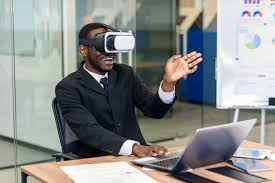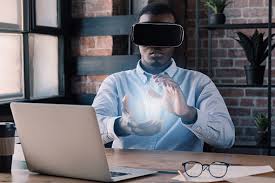The Growth Of Virtual Reality Technology In Nigeria
 The Growth Of Virtual Reality Technology In Nigeria
The Growth Of Virtual Reality Technology In Nigeria
Virtual Reality (VR) is an unreal experience that can be similar to the real world experience. It is a way of giving you a feel of being somewhere when you actually are not. The application of VR ranges from education, in medical and military training, to entertainment, in video games, and the likes. VR allows you to be completely immersed in the world of 3D and makes you believe you’re in the experience, because you totally feel like you’re in it. There is no limit to what virtual reality technology can achieve, as it has been seen in action in various ways.
Many companies now make use of VR in their daily operations, and it is the future of technology. The only way we could relate with the internet before was through mobile phones, computers, and the likes of them, but VR brings us to a place of being in the experience. VR is still evolving and developing but it has gained significant recognition in the world of technology.
VR has been around for a long time, but gained recognition in Nigeria in 2016. The hear 2016 was actually known as the year of Virtual Reality all over the world. And since then, it has been proclaimed as one of the next big things in technology. It is actually the future of technology. A great number of VR startups in many parts of the world has started ever since then, and some of them have been recorded to make substantial amount of money.
Chinese VR startups was reported to have received a total of $543 million in capital between 2015 and 2016. Also, in US, VR startups have received a total of $3.6 billion from investment capitalists. Most virtual reality companies in Nigeria began operation in 2016, and have also earned a profitable amount from VR.
VR has been used in educational sector where students learn with VR headset. For instance, Imisi 3D is an extensive reality creation lab that focuses on building educational and engagement experiences on Augmented Reality (AR) and Virtual Reality (VR). The goal of the startup is to make VR experiences available to everyone not considering the status. Imisi 3D is the first one to adopt VR in Nigeria.
StanLab is also making waves with VR. It started as a 3D interactive virtual lab application, but has expanded to deliver logical science education to students in lower-middle school and low-income countries in Africa. Quadron Studios is also another startup company that is making use of immersive technology to transform how individuals interact with life through VR. Quadron Studios is into film making, and they produce mainly VR animation content for storytelling and advertisement. The company is one of the graduads of the FbStart Accelerator by Facebook and Co-creatiom Hub (CcHUB).
With all these VR startups in Nigeria, it seems they are not getting enough recognition. This can be traced to the fact that both local investors and government are not involved in the growth process of VR technology. Most of the assistance that VR companies in Nigeria get comes from foreign investors.
 The Growth Of Virtual Reality Technology In Nigeria
The Growth Of Virtual Reality Technology In Nigeria
As of 2016, co-founders of Quadron Studios, Tayo Fasunon and Uche Anisuiba launched their VR startups but could not survive more than two years. But after the startup got into the FbStart Accelerator in 2018, VR film studio started gaining market acceptance and started to produce more revenue. StanLab started since 2016 also, but could not start generating income as expected until 2018, when it obtained a seed fund of €20,000 provided by the British Council.
For a technology like VR whose major aim was to address education issues in Nigeria, it would have gone a long way if they got supports from the government. According to a UNESCO report in 2014, over 10.5 million children are pit of school in Nigeria. This is actually the highest number any country has ever recorded. Given this issue in Nigeria, one would expect that the idea of VR would be accepted and supported on a large scale.
In 2016, the founder of Imisi 3D, Judith Okonkwo, coordinated the first VR hackathon in Nigeria. The program was held in Lagos, and it was the one that gave birth to the use of VR in medicine, education, and tourism. The winners of the competition at the event, Team LeVRn created a amazing feedback application that tutors customers on how code using hand gestures. They also got a seed investment of $5,000.
The idea of LeVRn was soon accepted by UNICEF innovation fund and was promoted to be a platform for curriculum based learning devices to improve the classroom learning experience of both teachers and students.
Read Also: Implications of Globalization Thorough Technology And What It Means For Businesses
The future of Virtual Reality in Nigeria
Despite the low funding and support given to VR in Nigeria, there are still a lot of things Nigeria can do with Virtual Reality. Whether we accept it or not, technology is going to cause a great transformation in different sectors of the country, and the better we accept it and align with it, the better for us.
 The Growth Of Virtual Reality Technology In Nigeria
The Growth Of Virtual Reality Technology In Nigeria
Virtual Reality has gone from being just a buzzword in Nigeria, it is gradually becoming our reality. According to a Facebook survey conducted on 1,028 people across Nigeria in 2018, 80% of Nigerians expect that Virtual Reality will become a part of their daily lives soonest. Existing businesses are also attaining more confidence to flourish, and this is giving rise to new startups as well.
With the development of more Virtual Reality companies in Nigeria, we can be confident that VR has come to stay and that for a long time. VR is no longer what it used to be in Nigeria, it is evolved than that and is gradually gaining full force in technology. VR enthusiasts and creators have continued to use their voices and skills to promote VR through hackathon’s and events in different parts of the country.
With Nigeria’s advanced growth and increase in technology, many industries are beginning t come to the reality of the use of VR in their businesses. Although, there is the fear that technology will totally displace human and jobs will be lost. But, still, we have to accept that VR is very important in overcoming major challenges the country is facing in different sectors like education, agriculture, finance, and tourism. VR creators should also give room for free trials on their content to allow people test their products before buying them. This will encourage new users to be familiar with the technology.
VR technology in Nigeria will soon get to a stage where we look back and wonder how we survived without it.
Hope you enjoy this article?
Share your thoughts in the comment session.
Contact us today for your business consultancy and business advisory services. We can help you fine tune your idea, structure your business, market your business, train your staff, consult on your retirement plan, coach you for financial success. We also write business plan and help with fund raising strategies and Grant applications. We can help you start, grow and expand your business.
Call or WhatsApp us now on 081 0563 6015, 080 7635 9735, 08113205312 or send email to dayohub@gmail.com and we will solve any of your business problem.
.
Related